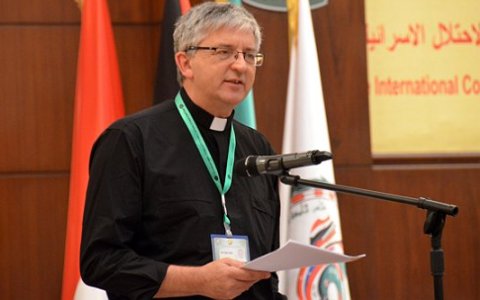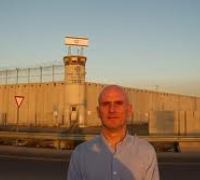Iraq: Palestinian children languish under Israeli occupation
by - 2nd January 2013
 moves by the Arab League in concert with British activists, are putting pressure on Israeli authorities to observe international legal commitments on children detained, imprisoned and tortured in Israeli gaols.
moves by the Arab League in concert with British activists, are putting pressure on Israeli authorities to observe international legal commitments on children detained, imprisoned and tortured in Israeli gaols.
The Baghdad Declaration on the Palestinian and Arab Prisoners in the Israeli Occupation Prisons, issued on 12 December, 2012, includes a devastating critique of Israeli treatment of prisoners including children, and calls for legal sanctions against Israelis involved in their detention.
The 11-point Declaration issued on the second day of the 70-nation conference in the Iraqi capital on 11-12 December, [see box], includes the setting up of an Arab fund to support Palestinian and Arab prisoners and their families.

Hosted by the Arab League on 11-12 December under the auspices of the Iraqi Government, it was addressed by both Iraqi President Galal Eltalibany, and Iraqi Prime Minister Nori Al Maliky as well as Palestinian Prime Minister Sallam Fayyad and Secretary General of the League of Arab States, Dr Nabil Elaraby. British jurists, parliamentarians, and representatives of civil society organizations also attended.
The Declaration calls on the United Nations and the international community to hold Israel accountable for its treatment of Palestinian prisoners, especially children, using all available legal mechanisms.
Between 500 and 700 Palestinian children are arrested by Israeli soldiers every year, according to NGOs.
‘I chose to speak on child prisoners because it is there that I believe we see most blatantly human rights abuses,’ said the Revd. Stephen Sizer, vicar of Virginia Water in Surrey, England, a presenter at the conference, who helped assemble the sizeable British contingent.
A widely-published critic of ‘Christian Zionism’, he is currently under church investigation following a complaint – which he opposes – of anti-Semitism issued by the Board of Deputies of British Jews.
‘Israel breaches international law by transferring minors from Palestine to Israeli jails,’ said Mr Sizer to Lapido Media, referring to the Fourth Geneva Convention. ‘They should be returned to Palestine if they have committed offences.’
Stone throwing
Sizer’s report to the conference sponsored by the United Nations and Arab League says that most of the offences committed by children are throwing stones at soldiers or settlers in illegal Jewish settlements in the Occupied Territories.
‘Armed resistance of an illegal military occupation is legitimate in international law,’ said Mr Sizer.
 Gerard Horton of Defense for Children International (DCI) who also attended the conference, does not deny children offend, but says that they have legal rights like anyone else.
Gerard Horton of Defense for Children International (DCI) who also attended the conference, does not deny children offend, but says that they have legal rights like anyone else.
‘Regardless of what they’re accused of, they shouldn’t be arrested in the middle of the night in terrifying raids, they should not be painfully tied up and blindfolded sometimes for hours on end, they should be informed of the right to silence and they should be entitled to have a parent present during questioning.’
A DCI-Palestine report found that among 311 sworn affidavits taken from children between January 2008 and January 2012, 90 percent were blindfolded and 75 percent suffered physical violence. A further 33 percent reported being strip searched, while 12 percent endured solitary confinement.
Mark Negev, spokesman for Israeli Prime Minister Benjamin Netanyahu has said in the past hat rock-throwing, throwing Molotov cocktails, and other forms of violence are ‘unacceptable’ – but stopping it should not be achieved illegally.
Israeli security agency Shin Bet denies the use of unlawful methods: ‘No one questioned, including minors, is kept alone in a cell as a punitive measure or in order to obtain a confession,’ it says.
But one 16-year old Mohamed Shabrawi (16) of Tulkarem in the West Bank, cited by DCI, tells of soldiers seizing him in his home at 2:30am. He claimed he spent the first seventeen days of his detention in solitary confinement, and was told his family would be arrested if he did not cooperate.
After twenty days he first saw a lawyer. After twenty-five days he was formally charged. Finally, he confessed to being a member in a banned organization and was sentenced to forty-five days in prison.
Horton believes the abuse of children is meant as a deterrent, as many interviewed minors state they never wish to see another soldier or go near a checkpoint.
‘Human rights abuses occur on all sides,’ said Mr Sizer. ‘We are most concerned about the use of detention by the Israelis for political purposes.’
The main resolutions contained in the Declaration:
- To set up an international legal committee to follow up the prisoners' case, and use legal mechanisms and tools, and relevant international covenants and conventions for the protection of their rights.
- To submit a request, in the name of the League of Arab States, to the United Nations to issue an advisory opinion from the International Court of Justice in the Hague on the legal status of the Palestinian and Arab prisoners in occupation prisons, and the legal commitments assumed by the occupier to address Israeli violations against these prisoners.
- To call upon the United Nations to send an international fact-finding committee to identify inhumane practices against prisoners who are subjected to violations in contravention with humanitarian international law.
- To ask the bodies and institutions concerned with the prisoners' case for the historic documentation of the Palestinian Prisoners' Movement.
- To launch international, humanitarian and media-related campaign to demand the release of prisoners.
- To use legal mechanisms and means to prosecute and hold Israel accountable for committing against Palestinian prisoners war crimes and crimes against humanity.
- To call on the League of Arab States to present Israeli officers involved in committing such crimes to criminal and human rights courts, in order to try Israeli occupation commanders and staff, and to affirm the implementation of the Arab League Resolution issued in this regard and adopted at the ordinary session in 2001.
- To establish an Arab fund for the support of Palestinian and Arab prisoners and their families, and the rehabilitation of those released from Israeli occupation prisons; and to mandate the League of Arab States, the Republic of Iraq, and the State of Palestine to develop the proposed fund's plan, working mechanisms and submitting the same to the forthcoming Arab Summit scheduled in March 2013 for its adoption.
- The Conference calls upon the League of Arab States to appoint an international envoy to follow up the prisoners' cases in all international fora, with the League of Arab States as a point of reference.
- The Conference hails the Palestinian people, mainly the prisoners and detainees in Israeli occupation prisons, with due respect and deference for their forbearance and steadfastness against the continuous Israeli aggression.
- The Conference congratulates the Palestinian people and leaders on the occasion of the GA Resolution for granting Palestine an observer state, and called for the investment of this position by all legal mechanisms and procedures to support the rights of Palestinian people, especially the prisoners, by acceding to the Four Geneva Conventions, and joining various legal institutions and organizations.
- Log in to post comments
